Summary
Executive Summary of the 7th Asia-Pacific/Arctic Maritime Security Forum
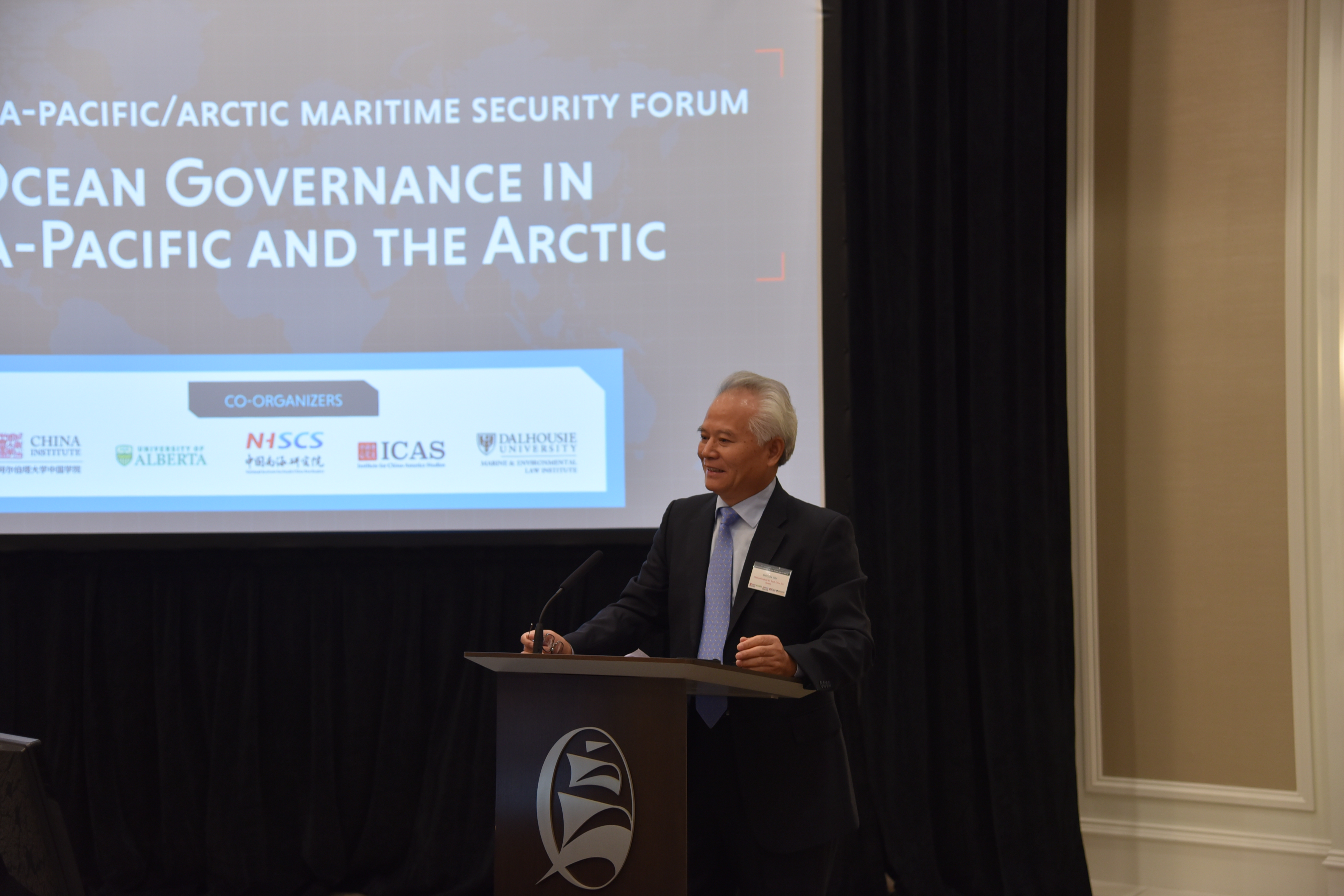
On September 24-25, 2019, the 7th Asia-Pacific/Arctic Maritime Security Forum was held at the Lord Nelson Hotel in Halifax, Nova Scotia, co-sponsored by the China Institute at the University of Alberta, the National Institute for South China Sea Studies, the Institute for China-America Studies, and Dalhousie University's Marine & Environmental Law Institute. Each panel centered on the theme of the conference: ocean governance in the Asia-Pacific and the Arctic.
Professor Gordon Houlden, Director of the China Institute opened with the welcoming remarks. He emphasized the importance of the conference hosting representatives from nine countries, including: Canada, the United States, China, Japan, Australia, India, South Korea, Sweden, and Singapore. He stated that whether or not an accord is reached on any or all of the issues discussed, bringing together experts from so many different backgrounds serves to provide deeper and stronger understandings of the perspectives of each group represented.
Dr. Shicun Wu, President of the National Institute for South China Sea Studies continued with his own remarks, recalling on the importance of Track II dialogues progress that has been achieved over the past six Maritime Security Forums. Additionally, Professor Phillip Saunders, Director of the Marine & Environmental Law Institute of Dalhousie University, concluded the welcoming remarks by underscoring the importance of inclusion in maritime security dialogues, noting the presence of senior naval (Canadian) and coast guard (US) representatives in attendance.
Panel 1: Regional Maritime Security Overview
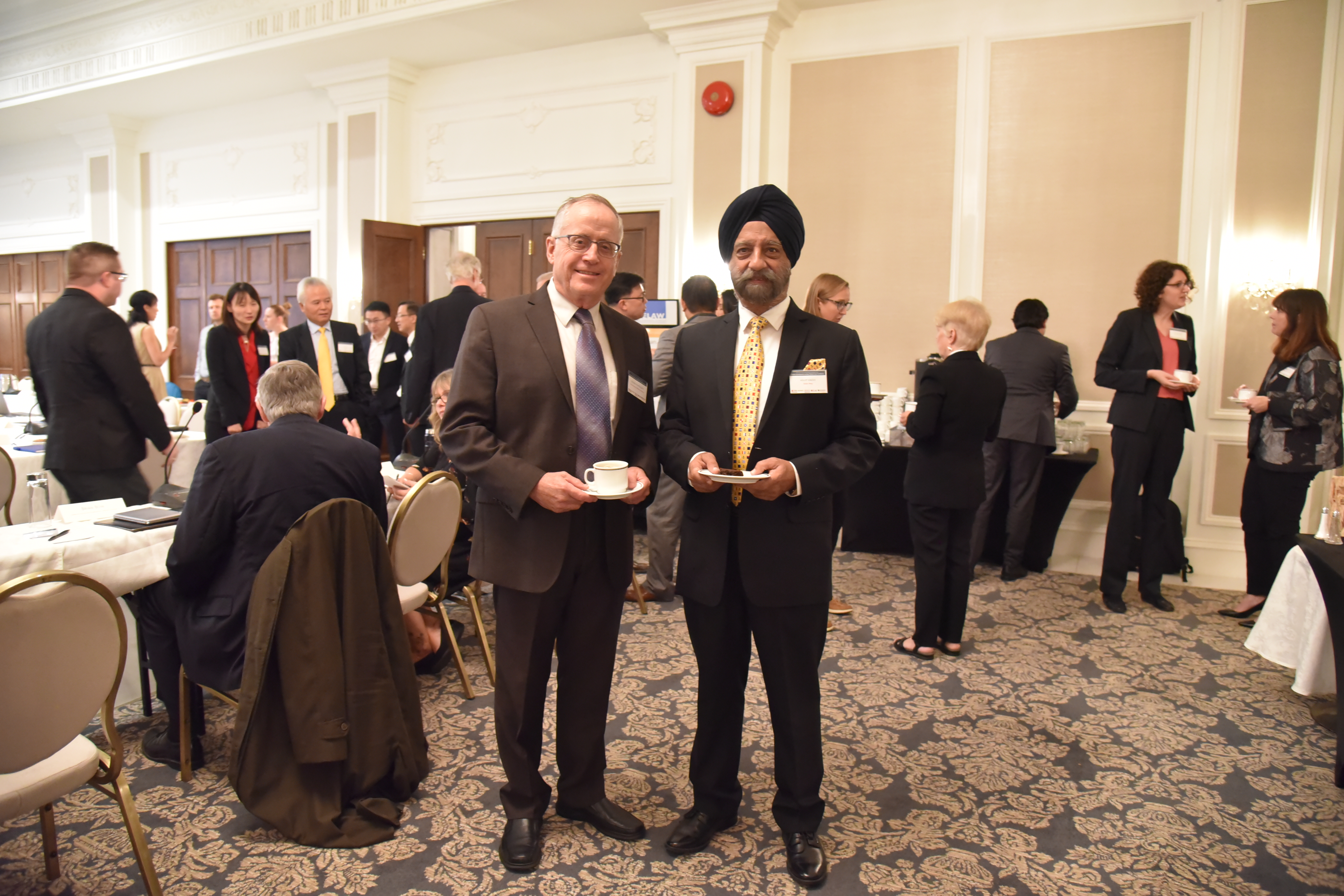
Dr. Shicun Wu, director of the National Institute for South China Sea Studies, moderated the first panel, which set a scene on the recent developments of maritime security in the South China Sea, Northeast Asian waters, the Indian Ocean, and the Arctic Ocean.
The South China Sea
Disputes in the South China Sea are vastly intertwined and complicated. It was the view of the panel then that the goal for the short term should be to manage these issues and not attempt to solve them. It was the conclusion of this panel that in order to help manage disputes in the short term, it is imperative for each stakeholder to show restraint (on the seas and at the negotiating table), continue to develop bilateral and multilateral relations, show respect for one another, always be ready and willing to have consultation, and to emphasize cooperation.
Northeast Asian Waters
The panel acknowledged that major stakeholders in the region, such as China, Japan, and South Korea, are obligated to cooperate under Article 123 of UNCLOS. This implies that the management, exploration, and exploitation of resources must be co-managed by these states. However, the panelists emphasized that as maritime security matters are not included in this Article, impacts to the co-management of trade and resource exploitation will arise, such as the 2008 Joint Development Agreement between China and Japan remaining unimplemented. Moving forward, maritime security should be viewed as inclusive, with decision making processes including State and non-State actors, as well as international courts.
The Indian Ocean
Despite being a relatively small ocean compared to the Atlantic and Pacific, it was noted that the Indian Ocean may be the most critical ocean. A quarter of the global population resides in the area, with about two-thirds of the world's oil, half of all containers, and a third of all bulk cargo makes its way through the Indian Ocean each year. The region is not without its own security concerns. For example, in the Gulf of Aden alone, losses from piracy in a five-year period reached $18 billion. However, foreign countries with a stake in the region have many pathways to help improve security in the region:
- Enhance the creation and maintenance of naval and coast guard forces
- Encourage the use of space-based AIS technologies and increase training workshops
- Utilize multilateral mechanisms, such as information sharing
The Arctic Ocean
The Arctic typically is viewed through a dual narrative, both as a place of peril and opportunity. Competing visions of the Arctic by the U.S. Russia, and China raise questions about how smaller Arctic States will be impacted, as well as the future of the region as a whole. As the changing strategic international environment impacts the Arctic, another question is being raised about whether new ordering principles or arrangements are needed to ensure these impacts are minimized or properly co-managed. Moving forward, it was recommended that the debate for the potential need for an Arctic Treaty or augmenting functional agreements should be revisited, as well as how such a decision should be conducted.
Panel 2: Best Practice of Regional Ocean Governance Models: Opportunities to Enhance or Replicate?
Michael Butler, director of the International Ocean Institute of Canada, moderated the second panel, which sought to begin a discussion on what lessons can be learned from the different models of ocean governance in the South China Sea, Northeast Asian waters, Southeast Asian waters, and the Arctic.
The panel began with a discussion of UNCLOS Article 197 and ocean governance, and their relationship with the United Nations Sustainable Development Goals. Ocean governance encompasses a wide swath of national and international institutions, which involve a combination of lateral, top-down, and bottom-up management systems. However, it was noted that transboundary impacts to countries outside of these agreements are often unaccounted for, which can lead to increased tensions. The panel posited that pursuing governance mechanisms that enhance regional security, such as promoting agreements, treaties, or codes of conduct, can also fall in line with U.N. Sustainable Development Goal 14, which aims to sustainably manage and protect marine and coastal ecosystems from environmental degradation.
In regard to the future of ocean governance in the Arctic, a narrative of inclusivity at the local, regional, and global levels must be taken into account. The emergence of bodies that are created to better understand the needs and priorities of residents of indigenous communities is seen as a prime example of the Arctic states approach to the usage of Article 176 of UNCLOS. The Arctic Fisheries Mortarium Agreement was cited as including the perspectives of all stakeholders, and yet still being successful by even including those with competing interests. However, challenges remain, such as ensuring that inclusivity becomes a norm in the broader goals and objectives that help decide national policy.
The panel moved next towards a discussion on lessons that can be learned from Australia's history of ocean governance, utilizing marine spatial planning and marine protected areas (MPA). Early failures in adequate ocean governance policies largely stemmed from the fact that there was no cross-jurisdictional coordination. In other words, the Federal government would push ad hoc coordinated actions without participation from states, territories, or indigenous peoples. Australia's current MPA system has seen greater levels of success by better incorporating these needs, allowing it to become more comprehensive, adequate and representative of the needs of stakeholders.
The panel concluded by looking at developments of ocean governance in the South China Sea and debated the role of UNCLOS in the region. Most of the time, when academics discuss the South China Sea, they overwhelmingly look at just the disputes. Discussions on the role of ocean governance is typically not given the weight it needs. Each coastal nation in the South China Sea try very hard to manage the region under what they consider to be their national boundaries and limits and also have different interpretations on how international policy should be implemented. UNCLOS should be used more as a compulsory channel to settle disputes, as its effectiveness as just a legal framework has not been seen as adequate.
Panel 3: Maritime Dispute Settlement Practice: Reviewing UNCLOS Article 287
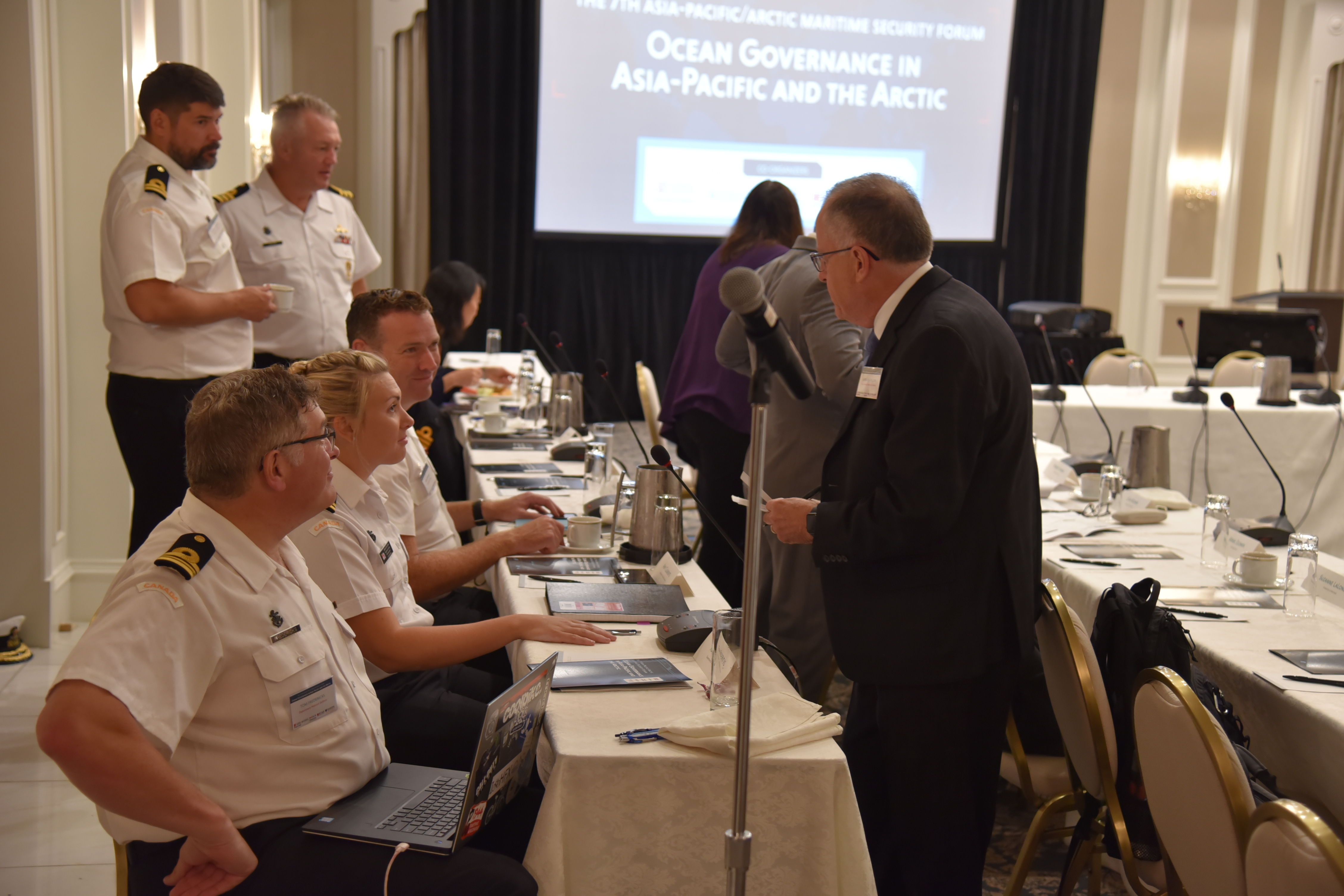
Professor Aldo Chircop, the Canada Research Chair in Maritime Law and Policy (Tier 1), at Dalhousie University's Schulich School of Law, served as the third panel's moderator. This panel explored UNCLOS Article 287, which allows States that have ratified the Convention the option to choose various forms of settlement disputes. The panel explored some of the options provided, such as the International Court of Justice (ICJ) and the International Tribunal for the Law of the Sea (ITLOS).
The panel began with a discussion on Part XV of UNCLOS and the question of whether compulsory adjudication should be a necessary feature of law for the peaceful settlement of disputes. Within the history of UNCLOS, it was noted that dispute settlement by adjudication has been rare, with compulsory adjudication being even rarer. As a result, there is potential for both procedural and substantive fragmentation, over-reach, and room for 'salami-slicing' tactics that could undermine the maritime stability.
The panel continued with a discussion on the reality in the East Asia, especially in the South China Sea and the East China Sea and their challenge to effective dispute settlement. It was noted that all the coastal states in this area have strengthened the construction of coast guard and maritime law enforcement. However, given the large disparities in capacity and management system, it would be a challenging task for countries to balance the safeguarding of maritime rights and crisis control measure. In this regard, the panel assessed the ICJ as a procedure of choice for maritime dispute settlement.
The panel also discussed the dearth of cases referred to ITOLS and its implication on the maritime order of northeast Asia. The panel assessed the implication of this situation for the current role and function of the Tribunal along with its jurisprudence to the current maritime order in Northeast Asia. The panel also put forth a discussion on how to fill in the gap between ITOLS as an international judicial body and maritime disputes in Northeast Asia to facilitate a better option for the stakeholders to choose a suitable dispute settlement mechanism.
The panel combined the previous discussions and compared the ICJ and ITOLS with the Annex VII arbitration, which serves as a compulsory means provided for in the Part XV of the UNCLOS. It was noted that one thing in common was that award of the three has binding force on both the parties to the case in principle, which is also a basic feature of arbitration in general international law. The panel suggested that from the perspective of the proceeding rather than the result of the ruling, Annex VII arbitration is compulsory because it can be initiated without a special agreement between the parties to the dispute in advance or afterwards.
Panel 4: Maritime Law Enforcement: Examining Regional and State Practice
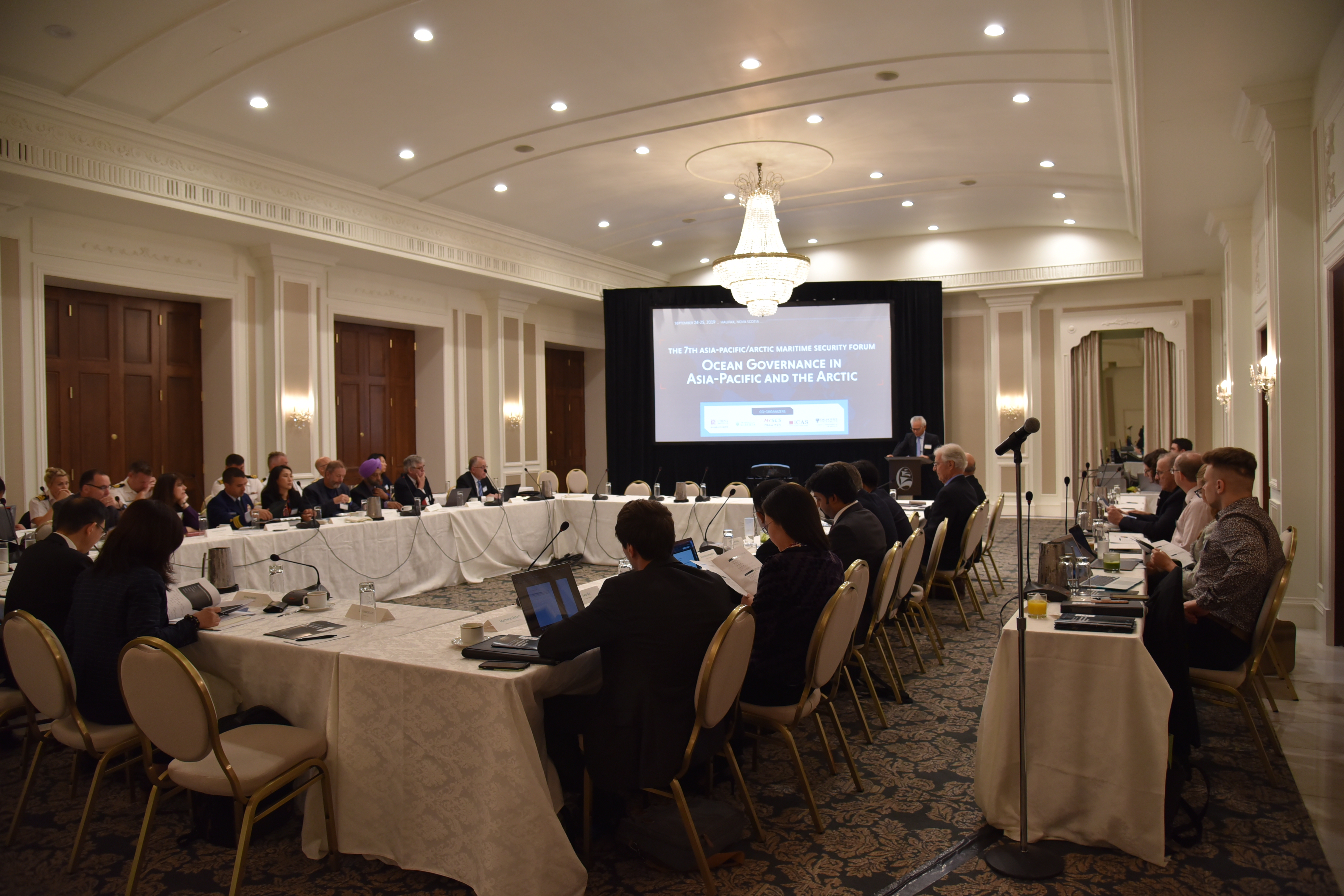
Gordon Houlden, director of the China Institute of the University of Alberta, moderated the fourth panel that staged the discussion regarding the practices and the existing challenges for maritime law enforcement in the respective maritime regions.
The panel began by addressing the U.S. experience related to maritime law enforcement. Although the United States is not a signatory of the UNCLOS, the U.S. Coast Guard respects and acknowledges most of the essence of the UNCLOS due to the fact that the U.S. regards the regime of the oceans as a rule-based system. This system creates a balance between coastal states sovereign rights, flag state sovereignty, and the freedom of navigation of the high seas. UNCLOS, together with other international treaties, helps define the rules that applies to the enforcement performance of the U.S. Coast Guard.
The panel continued with a discussion on some of the key variables that the Canadian maritime legal forces tried to deal with, especially in the Arctic context. Hence, Canada is putting a lot of effort into its law enforcement capabilities in the Arctic region. The panel pointed out that Canada's real focus is less on security but more on the norms. Canada concentrates on how to deal with the complex political environment, when more and more countries are getting involved in the Arctic region, and how to build up the norms in the Arctic for Canada to guarantee high functionality of its legal enforcement that protects the Canada's interests.
The panel also discussed the regional maritime enforcement agencies in Southeast Asian waters tasked with duties related to maritime defense, safety and security as distinct from navies as a non-traditional force. The discussion highlighted that lack of sources, access and integration of maritime law enforcement agencies among Southeast Asian countries make their capability insufficient for properly policing the Southeast Asian waters. The panel suggested that the countries of Southeast Asia ought to fill the vacuum in the domestic context and collaborate more with the regional partners.
Before the end of the session, the panel evaluated the development of coast guards in East Asia, where coast guards have become active since 2010. Nevertheless, the scope is unclear, which tends to confuse the boundary between military and law enforcement. Coast guards are widely used to defend and to consolidate claimants' positions, sometimes even involving collisions. The panel recommended to clearly define the duty of coast guards in East Asia, establish efficient communication and coordination mechanisms to prevent collision of legal enforcement forces, and push for regional cooperation between coastguards.
Panel 5: Marine Environment Issues: Shipping Standards, Marine Scientific Research, Cooperation
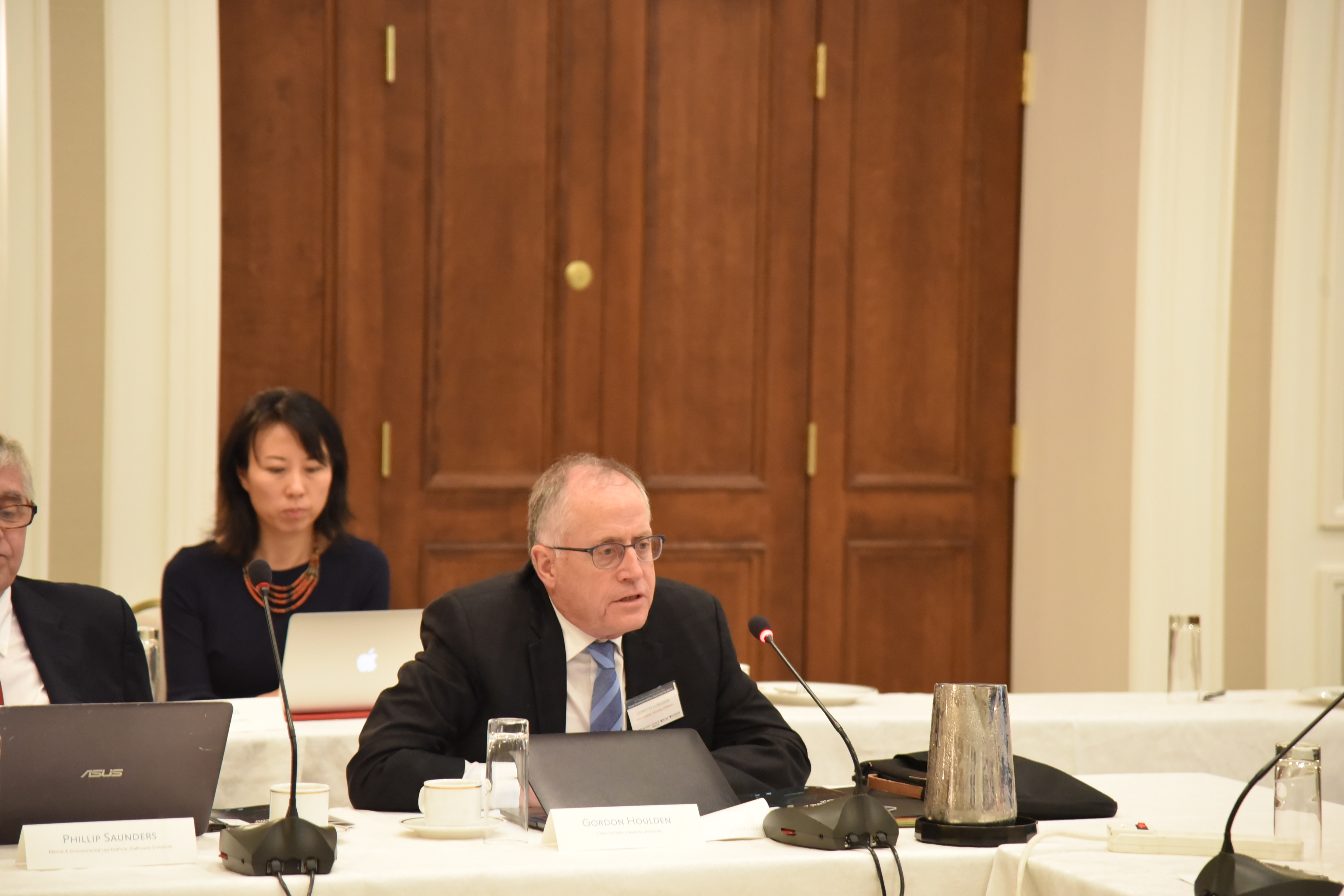
Dr. Wendy Watson-Wright, CEO of the Ocean Frontier Institute of Canada, served as the moderator for the fifth panel. This panel addressed a diverse group of topics that could bring opportunities for cooperation, including shipping, marine environmental protection, and marine scientific research.
The panel began with an introduction on the role of nonprofits in protecting the marine environment through marine spatial planning. Clear Seas, a Canadian nonprofit that was created out of concern that the Canadian marine industry, such as the transport of oil and LNGs, was subject to misinformation. In order to bring awareness to the public and lawmakers of the impacts these industries have on the marine environment, Clear Seas looks at hazards related to the transportation of all commodities in Canadian waters and informs the public on relevant maritime laws that regulate these industries. The panelists posited that promoting the continual improvement of the shipping industry and improving public understanding and confidence is a critical first step towards ensuring adequate regulations and enforcement measures are in place.
The panel continued by raising the question of whether emission standards in the Arctic and the South China Sea should be scaled up. The shipping industry emits harmful pollutants such as nitrogen oxide, sulphur oxide, volatile organic compounds, particulate matter, and of course, carbon dioxide. Air pollution has a clear impact on human health, the environment and the climate, with coastal communities being particularly vulnerable to these effects. Although ship emissions in both regions are subject to international standards under Annex VI of MARPOL, protections remain inadequate. The panel suggested that one mechanism that should be explored as a potential pathway is to institute emission control areas in each region, which would have the dual effect of promoting cooperation from participating states.
The panel continued with a discussion on potential regulatory strategies of heavy fuel oil (HFO) for Arctic shipping. In 2011, the International Maritime Organization (IMO) adopted a ban on the use and transportation of HFOs in Antarctic waters came into effect. Since then, there has been debate amongst the IMO, Arctic Council, industry associations, and environmental NGOs about whether to adopt a similar policy for Arctic waters. However, indigenous peoples have not been directly part of the conversation. Challenges continue to exist that have stalled the creation of an HFO regulatory strategy that must be dealt with through holistic approaches.
The panel concluded with an examination of oil spill preparedness and response cooperation in Northeast Asia, looking at the case of the Sanchi Incident. Although there were sufficient amounts of information sharing amongst countries involved in the response and cleanup, such as China, Japan and South Korea, the collective response was still considered inadequate. There was insufficient knowledge or training on how to properly deal with the type of oil that spilled, cargo condensate, which led to a failure in properly understanding the scope of the spill.
Discussion: Cooperation on Ocean Capacity Building
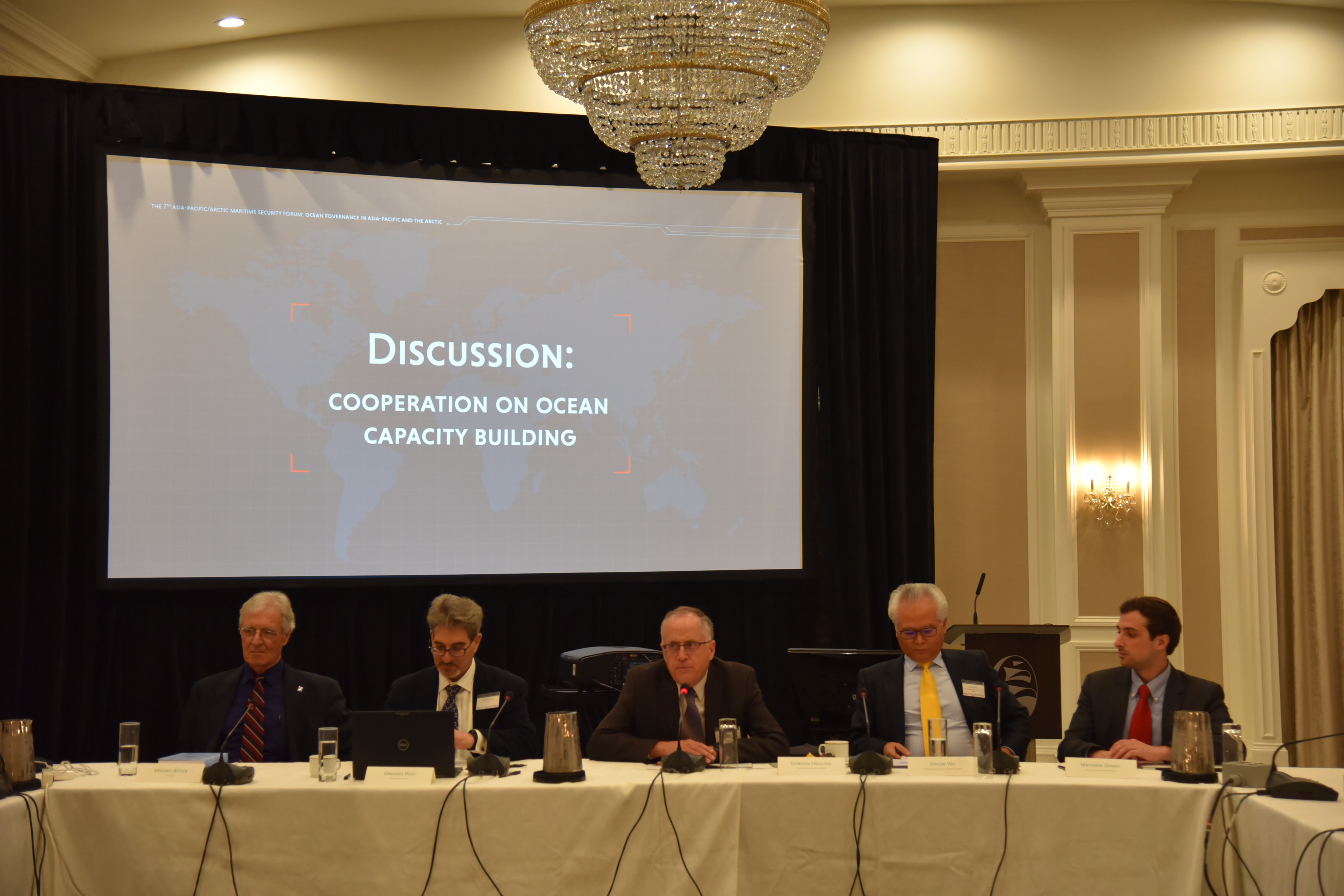
Dr. Gordon Houlden, director of the University of Alberta's China Institute, moderated the final panel. Like the previous panels, this panel began with presentations from select research institutions from various regions. However, as one of the overarching themes of the Forum was to find innovative ways in which conflict can be mitigated through cooperation and information sharing, this section allowed for an open discussion amongst all participants of the conference to explore opportunities of institutional cooperation on ocean governance.
The panel began with the introduction of the China-ASEAN Academy on Ocean Law and Governance, and the first four annual programs that have been completed since January 2016, collaboratively organized by the NISCSS, China-Southeast Asia Research Center on the South China Sea Studies (CSARC), and International Ocean Institute-Canada (IOI-Canada). The Academy will launch the first special program on maritime law enforcement in late October 2019, with support from the Australian National Centre for Ocean Resources and Security (ANCORS) of the University of Wollongong. CSARC was introduced as a consortium of renowned research institutes and think tanks of China and ASEAN countries, dedicated to research and projects to promote cooperation among littoral countries of the South China Sea.
IOI-Canada's flagship training program, Ocean Governance: Policy, Law and Management, was introduced next. It is held annually in Halifax, now has more than 735 alumni from more than 100 countries worldwide. Participants after completing the program have shared and disseminated their acquired knowledge and skills on returning home through various means so that training program could have multiplier impact on ocean governance.
Next, Australian experiences in capacity building for ocean governance of the Pacific region and its relevant experiences with some African, Caribbean and ASEAN countries. Regarding ASEAN countries, capacity building has been conducted mainly through bilateral assistance and FDA between Australia and individual member countries such as Indonesia and Malaysia. Regarding Pacific countries, capacity building has largely been through training and scholarship opportunities between government agencies, as well as assistance in monitoring, control and surveillance in fisheries and maritime security, and assistance in law and policy development.
The final presentation of the conference introduced geographic information systems technology (GIS) as a platform for collaborative maritime studies. Much of the analyses conducted by academic and research institutions are in the form of commentary and opinion pieces that largely focus on limited aspects of this domain. Consequently, scholars and the general public lack an objective and comprehensive educational tool to gain both a big picture understanding combined with deeper, specialized insights into various economic, security, and legal sectors in the maritime domain presented through direct and interactive data visualizations.
By using GIS and its related technologies to create interactive maritime trackers, academic circles and government entities have a new way of cooperating and sharing data with one another outside of the conference room. Representatives of research institutions, navies, and coast guards were invited to collaborate and streamline issues related to maritime policy research through a visual and interactive platform. As a result, future collaboration is expected following the conference between these entities that will allow for greater clarity in maritime policy research by providing accurate, live data tracking on developments in the various sectors of the maritime domain.
Concluding Discussion
Some participants pointed out that sometimes it is difficult to find information about what is going on in a particular region for capacity building. Therefore, the discussion on this panel may be helpful for information sharing.
There were discussions on creating a maritime tracker of the Arctic region, though it was pointed out that although the current capabilities may not be sufficient to track numbers of vessels transiting different routes of the Arctic region, tapping into historical AIS data database which can differentiate different types of vessels and be used for varied purposes.
Some participants reviewed the efforts of Canadian scholars and universities to assist capacity building of island states with limited expertise and resources. It was pointed out that scholars and legal experts need to help smaller states to develop their capacity to fulfill their marine management responsibilities and share development opportunities created by accessing relevant international conventions and legal instruments.
Some participants pointed out that funding and international cooperation related to capacity building very much depend on the current political climate. Speakers answered questions about fundraising in different political contexts. For instance, most of the research and training programs that ANCHORS have are based on contracts and other parties of the contract are responsible for relevant funding for ANCHORS. About half of IOI-Canada's funding is from the headquarters in Malta. IOI-Canada needs to spend significant amount of time for fundraising so in order to provide scholarships for people from under-developed countries and communities to participate its training programs. However, impact from the political climate on IOI-Canada was viewed as negligible. The China-ASEAN Academy on Ocean Law and Governance mainly relies on the funding from the China-ASEAN Cooperation Fund. It is very difficult for the Academy to obtain donations from foreign parties and international NGOs, because the latter would risk being interpreted as being supportive of China's position in the sensitive South China Sea dispute.
The panel and Forum concluded with a final discussion on ways in which to promote strategies of developing capacity building programs. Information sharing and cooperation are considered effective ways in which to alleviate stresses to project or program funding, especially if changing political climate were to become an issue. Dr. Gordon Houlden, Dr. Shicun Wu, and Professor Phillip Saunders thanked everyone for their participation and all three look forward to the 8th Asia-Pacific/Arctic Maritime Security Forum to be held in China in 2020.